Review| First Man
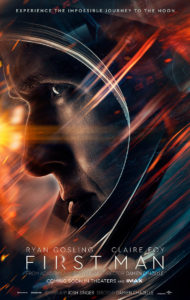 Going to space is hard. As last week’s Soyuz rocket failure proves, even a well-proven rocket with a spotless half-century track record can still remind us that getting to space isn’t any easier than it was for Neil Armstrong.
Going to space is hard. As last week’s Soyuz rocket failure proves, even a well-proven rocket with a spotless half-century track record can still remind us that getting to space isn’t any easier than it was for Neil Armstrong.
It may not seem like it, since space is probably closer to you than the ocean; if there was a highway to space, you could drive there in less than an hour. Like Armstrong himself said near the beginning of First Man, the atmosphere is so thin that it’s hard to see when you’re above it. Even so, it took the collective effort of almost the entire nation, the dedicated service of 400,000 people, and the invention of a dozen different industries and scientific fields to build the most powerful vehicle mankind has ever built—all to put a spider-shaped rowboat and two men on the moon.
But as hard as it is to get up into space, for Neil Armstrong, it might just be harder to get back down.
First Class
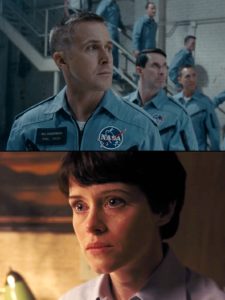 First Man is a first-class biopic with first-rate actors. Ryan Gosling plays the notoriously straight-laced Armstrong as notoriously straight-laced, with subtle emotion underlining his performance where necessary. Claire Foy is perfect, as always; though I couldn’t shake the thought that, even perfectly portraying a 60’s American housewife, she still looks like royalty. Neil’s fellow astronauts fit their personas remarkably well; Kyle Chandler as Deke Slayton, in particular, looks like he was simply cut out of the 1960s and pasted onto the screen. Even the child actors they found to play the Armstrong kids do an excellent job. And the other astronaut wives, whose job on screen is largely the same as their job in reality (“look pretty”), still managed to convey an air of quiet desperation beneath the perms and beauty products.
First Man is a first-class biopic with first-rate actors. Ryan Gosling plays the notoriously straight-laced Armstrong as notoriously straight-laced, with subtle emotion underlining his performance where necessary. Claire Foy is perfect, as always; though I couldn’t shake the thought that, even perfectly portraying a 60’s American housewife, she still looks like royalty. Neil’s fellow astronauts fit their personas remarkably well; Kyle Chandler as Deke Slayton, in particular, looks like he was simply cut out of the 1960s and pasted onto the screen. Even the child actors they found to play the Armstrong kids do an excellent job. And the other astronaut wives, whose job on screen is largely the same as their job in reality (“look pretty”), still managed to convey an air of quiet desperation beneath the perms and beauty products.
The film was beautiful, too; Damien Chazelle proves once again that he can compose a shot and scene as well as any working director today. My favorite sequence was probably the entire Gemini 8 mission, from launch to landing. We experience the mission from Neil’s point of view, flying with him into space, almost in real-time. The feeling of being strapped to the top of a runaway ICBM is impossible to describe, and the triumph of the Agena docking was a thrill. But the set-piece for that part of the film, the Gemini 8 thruster malfunction and uncontrolled spin, is the real knockout of the sequence; building and resolving tension like a mini-movie in the middle of the movie.
Chazelle also knows well when to allow the film’s sparse sounds or even silence carry the audio, and when to layer in Justin Hurwitz’s thoughtful, retrofuturistic score; which feels like it’s made from classical instruments and slowed-down space sounds and rocket engines. Similarly, the variable use of NASA file footage and impeccable CGI is nearly seamless.
That said, I did have some beefs with this film. As an incurable, lifelong NASA fanboy, I wish they’d shown us an exhaustive amount of technical detail; but, more realistically, I wish Apollo 11’s launch had been shown in the same first-person, real-time perspective that Gemini 8’s was shot in. And while Neil was generally quiet and soft-spoken, I think Gosling went a bit overboard and showed him as a bit too reserved, a bit too somber. The archival tape and transcripts from his missions show him to be a serious man, but not immune to wonder.
Still, I can’t help seeing the sombering-up of Armstrong’s character as intentional. (And, if you are concerned about spoilers, they will follow below.)
The Understated Hero
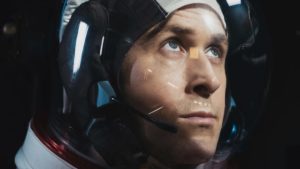 Neil A. Armstrong was undoubtedly the platonic ideal of the mid-century American hero. He was brave, brilliant, bold, and strong, of course; but he was also understated, soft-spoken, stoic, measured, and humble. He was not the kind of man you’d expect to be first on the moon, which is probably why he was the perfect choice.
Neil A. Armstrong was undoubtedly the platonic ideal of the mid-century American hero. He was brave, brilliant, bold, and strong, of course; but he was also understated, soft-spoken, stoic, measured, and humble. He was not the kind of man you’d expect to be first on the moon, which is probably why he was the perfect choice.
In fact, Armstrong exhibited many of the “fruits of the Spirit”—not all of them, of course; but in our modern society of overstatement, shouting matches, extreme emotionality, wild polarization, and unchecked pride, we can learn a lot from Armstrong’s example.
His humility, for instance: “the Lord lifts up the humble,” Psalm 147 promises us; “he casts the wicked to the ground.” It’s tough to imagine anyone being lifted any higher than to the moon, and it’s his humility which gets him there.
Or his peaceful, even-keeled nature around others, as we see in Romans 14: “So then let us pursue what makes for peace and for mutual upbuilding.”
But he wasn’t perfect, a fact which First Man isn’t afraid to tangle with. His detachment, the cracks in his thin veneer of self-control, and his drive to climb into a vehicle going further than any man had ever gone just to avoid a discussion with his wife all contribute to a picture of a man who has gone into space and doesn’t have the control to get back down.
Under Control
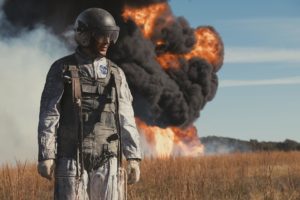 The film starts with a gripping sequence of Armstrong’s failed X-15 test flight, a near-disaster that he’s only able to survive because of his impressive piloting skills. And from that moment on, the film proves that—as Janet Armstrong spells out to Deke Slayton later in the film—Neil, Buzz, and even NASA itself are just “a bunch of boys making models out of balsa wood! You don’t have anything under control!”
The film starts with a gripping sequence of Armstrong’s failed X-15 test flight, a near-disaster that he’s only able to survive because of his impressive piloting skills. And from that moment on, the film proves that—as Janet Armstrong spells out to Deke Slayton later in the film—Neil, Buzz, and even NASA itself are just “a bunch of boys making models out of balsa wood! You don’t have anything under control!”
Is there anything more realistic that they could’ve put in this film? We don’t have anything under control. And Nixon’s “In Event of Moon Disaster” contingency speech, written by William Safire and referenced during the run-up to the Apollo 11 mission, proves that we know we don’t have anything under control.
“Which of you by being anxious can add a single hour to his span of life?”
—Luke 12:25, ESV
Say it with me: I don’t have anything under control. The older I get, the more real this feels. I always thought I’d have it figured out by the time I became an adult; but I’m older now than Armstrong was at the beginning of First Man, and I’m only getting less sure about my grip on reality, my control of my fate.
Sometimes life is like sitting atop a Titan II ICBM while the rocket engines ten stories beneath you push you inexorably into the sky. Sometimes it’s like almost passing out at the controls of a failing Gemini capsule while it spins out of control around you. And on rare occasions, it’s like popping open the hatch of the Eagle lunar module onto a pristine and striking lunar surface.
But, because I trust that the Builder of my rocket knows what He’s doing, I’m actually okay with that lack of control. If it were up to me, I’d never get anything under control.
It would be beautiful, it would be striking, but I’d never make it back down again.
Things That Maybe We Should’ve Seen
A Long Time Ago
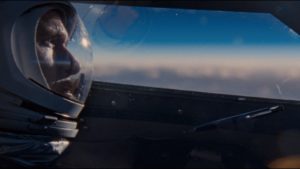 First Man goes to great pains to show true beauty: the Earth from the edge of space, the flight to the moon, our planet seen from our natural satellite, and even the beautiful desolation of the moon itself. But while Armstrong does address this beauty in his interview to become an astronaut, his focus is on what space means to all of humanity. His “giant leap for mankind” is just that: for mankind.
First Man goes to great pains to show true beauty: the Earth from the edge of space, the flight to the moon, our planet seen from our natural satellite, and even the beautiful desolation of the moon itself. But while Armstrong does address this beauty in his interview to become an astronaut, his focus is on what space means to all of humanity. His “giant leap for mankind” is just that: for mankind.
Across the board, the men who walked on the moon shared an insistence that the Earth needed to be protected, and that the change which comes over a person upon seeing their home planet from space is an invaluable experience that everyone should have. The Armstrong of First Man knew this from before his astronaut career, sure that men in space would see “things that maybe we should’ve seen a long time ago.”
“The nations rage, the kingdoms totter; he utters his voice, the earth melts.”
—Psalm 46:6, ESV
God built us to be completely and totally dependent; on Himself and on one another. That’s how we were meant to live. Life seems so certain from down here looking up; our world is solid and constant and immovable. But the astronauts know something experientially that we on the ground have to take the Bible’s word for: our world is tiny, fragile, and prone to melt. On our own, we’re tossed about without any control.
Even the strongest and boldest among us would be lost, unable to come down.
But Armstrong shows us the way here, too. When he returns from the moon, and his wife Janet is brought to see him in quarantine, he does something he hasn’t really done since his daughter died.
He reaches out. Neil initiates contact with his wife. He seeks connection with someone else.
And with his fingers reaching toward another, he comes back down again.





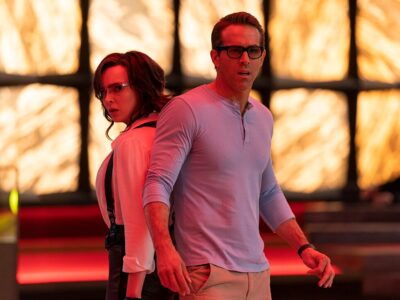


Pingback: #186 – First Man and A Matter of Perspective | Reel World Theology